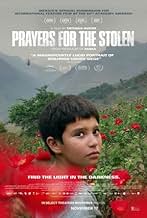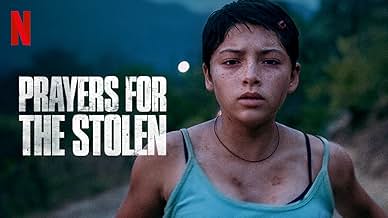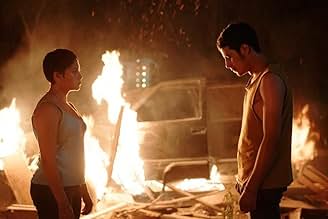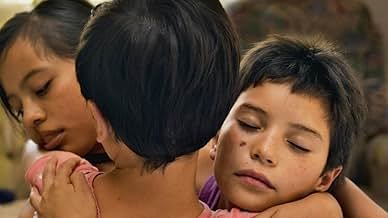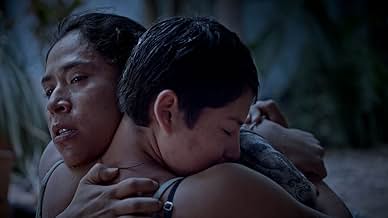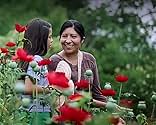IMDb RATING
7.3/10
4.4K
YOUR RATING
Life in a town at war seen through the eyes of three young girls on the path to adolescence.Life in a town at war seen through the eyes of three young girls on the path to adolescence.Life in a town at war seen through the eyes of three young girls on the path to adolescence.
- Director
- Writers
- Stars
- Awards
- 23 wins & 36 nominations total
- Director
- Writers
- All cast & crew
- Production, box office & more at IMDbPro
Featured reviews
Shedding light on the fearful existence & perilous life that women & children are forced to live in Mexican towns ravaged by drug trade, cartel violence & human trafficking, Prayers for the Stolen (Noche de fuego) captures this brutal reality through the coming-of-age journey of a young girl & her two best friends and makes for a gritty, affecting & heartbreaking slice of social realism.
Written & directed by Tatiana Huezo in her feature film debut, the film benefits from her earlier efforts as a documentarian as she utilises a similar raw style & uncompromising approach that adds a realistic touch & unflinching quality to the drama and allows it to unfold at its own pace while remote setting, grim atmosphere & sincere performances further strengthen the material.
However, the emotional impact the film was aiming for doesn't translate as well as it should've, for much of the plot remains uneventful, some scenes drag on for too long while others are cut earlier than expected, thus resulting in a picture that's harsh & harrowing in bits n pieces yet is unable to get under the skin. The film presents the difficult state of affairs but doesn't truly dig into it.
Overall, Prayers for the Stolen explores friendship, endurance, loss of innocence, cartel terror & endemic violence to give the audience an insight into the dark side of modern-day Mexico, and begins Huezo's feature filmmaking endeavours on a promising note if not a rewarding one. The performances are strong & gripping but the characters & situations depicted still required more development & fine tuning. Worth a shot anyway.
Written & directed by Tatiana Huezo in her feature film debut, the film benefits from her earlier efforts as a documentarian as she utilises a similar raw style & uncompromising approach that adds a realistic touch & unflinching quality to the drama and allows it to unfold at its own pace while remote setting, grim atmosphere & sincere performances further strengthen the material.
However, the emotional impact the film was aiming for doesn't translate as well as it should've, for much of the plot remains uneventful, some scenes drag on for too long while others are cut earlier than expected, thus resulting in a picture that's harsh & harrowing in bits n pieces yet is unable to get under the skin. The film presents the difficult state of affairs but doesn't truly dig into it.
Overall, Prayers for the Stolen explores friendship, endurance, loss of innocence, cartel terror & endemic violence to give the audience an insight into the dark side of modern-day Mexico, and begins Huezo's feature filmmaking endeavours on a promising note if not a rewarding one. The performances are strong & gripping but the characters & situations depicted still required more development & fine tuning. Worth a shot anyway.
10aarpcats
Watching this movie reminded me of the blurry photographs of British children playing in the ruins of London during the Blitz. If a building were bombed today, the unsafe structure would be guarded by cops to keep the children from being buried in the rubble. But, when the city is being bombed every night, what's the difference in whether a child dies from bombíng or under a pile of loose bricks? War brings death and death becomes normal.
In the bucolic and gorgeous mountains of Jalisco, war is constant and unending. Flickering fire flies have been replaced by the lights of cell phones as villagers try desperately to get a call "to the other side" for money to leave. Staying means enslavement to the cartel and losing your daughters to brutal sex trafficking. Instead of bombs, the cartels and the useless police rain terror on the adults in the village. Everyone knows a dead girl, and everyone knows how to harvest opium. And everyone knows to run when the US helps Mexico spray chemicals on the poppy crops.
Yet, just as the London kids entertained themselves with soccer, school, story telling and friendships, so too do the children in the village in Jalisco. What terrifies their parents simply is business as usual to them. They can't help growing up in war, but they are growing up. They want to dance, go to rodeos, date - every day things that are death defying in Jalisco.
It's an excellent movie about how the human spirit survives the unthinkable.
I want to tie Americans to chairs to help them understand exactly what American drug habits, the War on Drugs and the crisis in Central America is doing to desperate, terrified people. I want them to understand that they aren't coming heee for handouts. I want them to understand that they are coming here to stay alive. I want them to see children burned with American pesticides.
The acting is astonishing, the cinematography brilliant and the story heartbreaking. And this story happens every day in Mexico.
In the bucolic and gorgeous mountains of Jalisco, war is constant and unending. Flickering fire flies have been replaced by the lights of cell phones as villagers try desperately to get a call "to the other side" for money to leave. Staying means enslavement to the cartel and losing your daughters to brutal sex trafficking. Instead of bombs, the cartels and the useless police rain terror on the adults in the village. Everyone knows a dead girl, and everyone knows how to harvest opium. And everyone knows to run when the US helps Mexico spray chemicals on the poppy crops.
Yet, just as the London kids entertained themselves with soccer, school, story telling and friendships, so too do the children in the village in Jalisco. What terrifies their parents simply is business as usual to them. They can't help growing up in war, but they are growing up. They want to dance, go to rodeos, date - every day things that are death defying in Jalisco.
It's an excellent movie about how the human spirit survives the unthinkable.
I want to tie Americans to chairs to help them understand exactly what American drug habits, the War on Drugs and the crisis in Central America is doing to desperate, terrified people. I want them to understand that they aren't coming heee for handouts. I want them to understand that they are coming here to stay alive. I want them to see children burned with American pesticides.
The acting is astonishing, the cinematography brilliant and the story heartbreaking. And this story happens every day in Mexico.
Yikes but this is quite a difficult film to watch. It's centred around three teenage girls who live amidst the poppy fields of Mexico. "Ana" (Maria Membreño) "Paula" (Alejandro Camacho) and "Maria" (Giselle Barrera Sánchez) try to live their lives as normally as they can, but the fact that their school teacher is leaving because he won't pay protection money to the drug pedlars gives us some indication of the society in which they live. Indeed, it's this teacher who raises the issue of a missing girl - and that enlightens us to the fact that once they reach a certain age, these young women have other "uses" and nobody dares speak out about it. The chronology flits between the current life of these three and their younger childhood and illustrates that for them, there is little hope of change unless they are prepared to leave - but that they don't want to do with out each other or their mothers (the fathers don't feature at all in this drama). The rather courageous role of motherhood is really well exemplified by Mayra Batalla's contribution as "Rita". A woman who treats her daughters first menstruation with a dread that the young girl does not yet appreciate the significance of. It's a beautifully photographed vicious circle, with the emphasis on vicious. There are attempts at government interventions, local troops stationed and helicopters depositing toxins on the flowers, but the thrust here from director Tatiana Huezo is of a cycle of depressing and dangerous inevitability that it is difficult to see a way out of. The three young actors perform evocatively here offering us quite emotional and poignant characterisations. They are not simply going to give up - but it's not that simple. Harrowing, yes, but it's clearly been written and presented offering hope for the girls and to raise some awareness of the fact that as long as the West keeps buying the stuff, these people will live in a modern day slavery that turns your stomach.
Anna, Paula and Maria are three young girls growing up in a remote mountain town in the Mexican rainforest. Poppies are grown locally and harvested by the townspeople controlled by the Cartels. Life is precarious and the balance of power between Police, Cartel and Military is tenuous at best. This is impeccable Social Realist film with many captivating performances from non actors. If you like the genre you will like this one. 8/10.
When I went to see this movie, I knew it was gonna be tough, but I didn't imagine it to make me cry that much. The story really goes to the heart.
Also, the child actors did a wonderful job!
Also, the child actors did a wonderful job!
Did you know
- TriviaOfficial submission of Mexico for the 'Best International Feature Film' category of the 94th Academy Awards in 2022. It made the shortlist but did not end up nominated.
- SoundtracksCariñito
Written by Ángel Aníbal Rosado
Performed by Zindu Cano, Vivir Quintana, Alejandro Díaz, Leo Soqui, Rodrigo Garibay, Alfonso Figueroa, Leonardo Heiblum and Jacobo Lieberman
- How long is Prayers for the Stolen?Powered by Alexa
Details
- Release date
- Countries of origin
- Official sites
- Language
- Also known as
- Молитви за викрадених
- Filming locations
- Production companies
- See more company credits at IMDbPro
- Runtime1 hour 51 minutes
- Color
- Aspect ratio
- 1.78 : 1
Contribute to this page
Suggest an edit or add missing content




